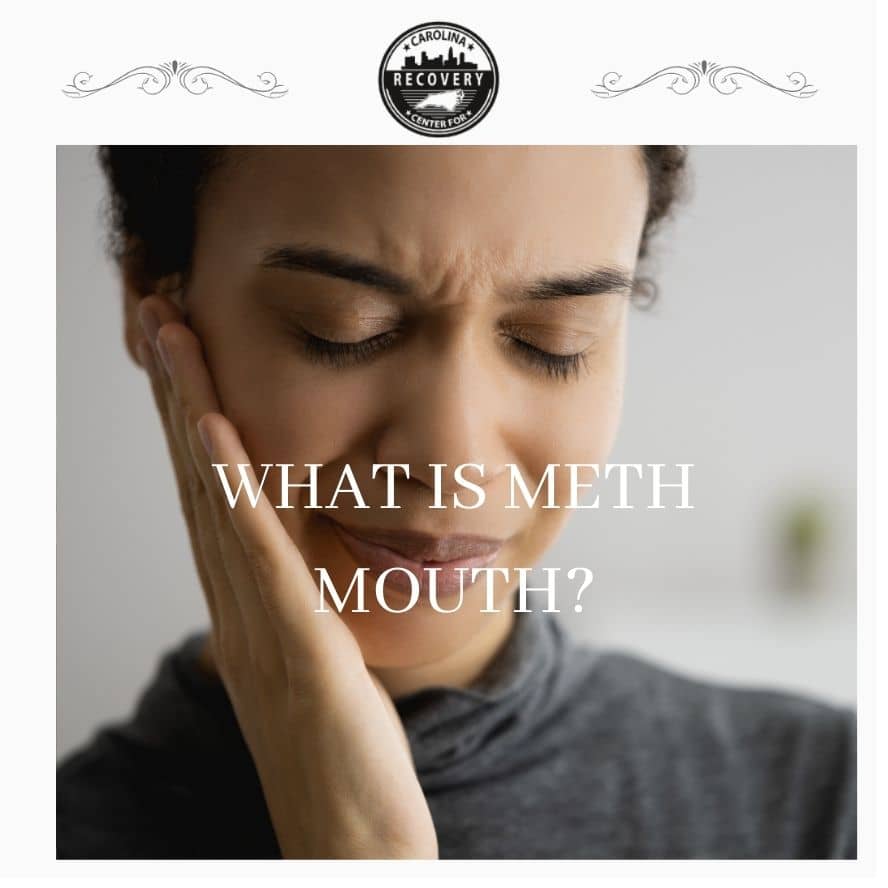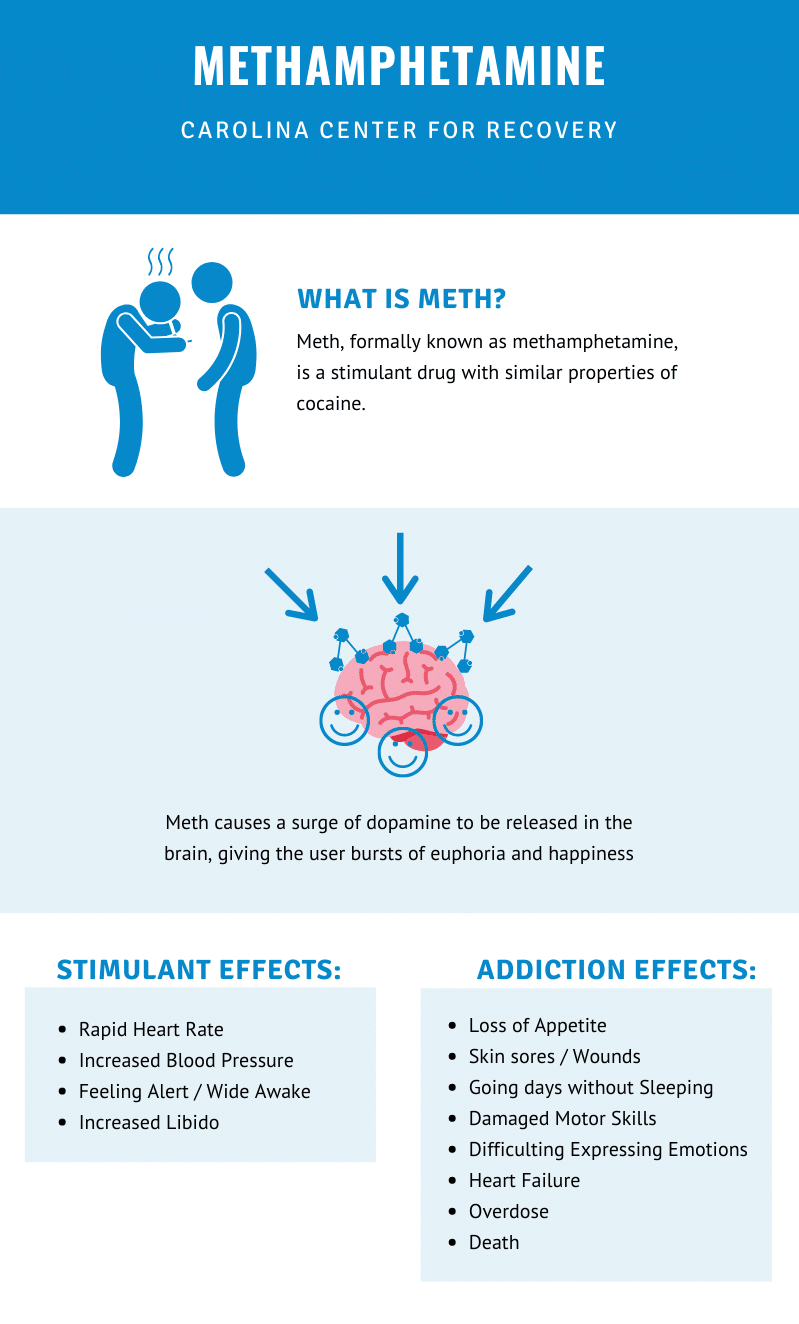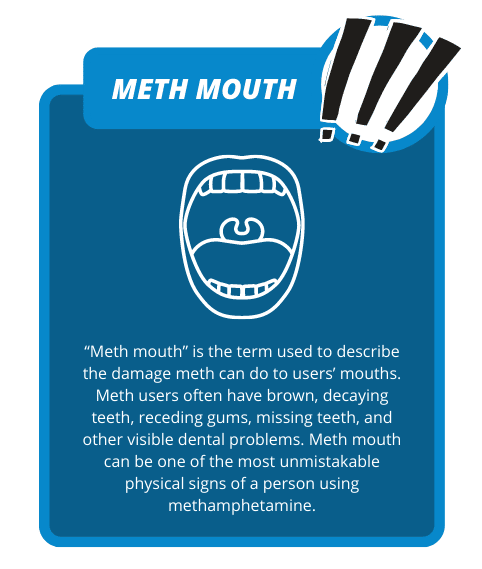What is Meth Mouth? Understanding How Meth Affects Dental Health

Medically Verified: 2/1/24
Medical Reviewer
Chief Editor

All of the information on this page has been reviewed and verified by a certified addiction professional.
The number of people abusing meth is increasing in the United States. Research from 2020 showed that over 2.6 million people in America used methamphetamine, and there is no sign of this number going down.[1]
People who get caught up in meth abuse often face devastating mental and physical health consequences. Many face life-altering legal and financial trouble, lose jobs, and significant relationship strain.
Meth abuse and addiction are complex conditions that require caring, holistic treatment. Prolonged periods of meth abuse can cause changes to your body and brain that make it very difficult to stop using the drug. Without getting help, people who abuse meth are likely to experience the painful consequences of addiction, including a painful dental condition known as “meth mouth.”
Treatment for meth addiction must begin with a detox program followed by a comprehensive treatment program. To put meth addiction behind you and commit to living a healthy, sober lifestyle, you must learn the skills you need to avoid relapse and stay engaged in recovery for the rest of your life.
For more information about starting a meth addiction treatment program, contact the Carolina Center for Recovery staff today.

What is Meth?
Methamphetamine is an addictive stimulant street drug. Meth looks like blueish white rocks and may also be called:
- Crystal meth
- Glass
- Crank
- Ice
People smoke, inject, or snort meth. Users can also take it in pill form. When ingested, methamphetamine provides an intense stimulant effect.[2] People may also experience a euphoric or “high” feeling when using meth. Users report feeling powerful and may feel relief from physical and emotional pain.
Methamphetamine is an illegally manufactured drug. While people can buy the ingredients used to make meth in most drug stores, the process of producing meth is complex and dangerous. In recent years, foreign, mass-produced meth has flooded the U.S. market.
Like other illegal street drugs, methamphetamine is uncontrolled and unregulated. It is impossible to know precisely what is in the meth you buy on the street. Numerous reports have been of meth being laced with PCP, fentanyl, and other substances.[2] Using unregulated drugs puts people at risk of overdose and other life-threatening medical events.
What is Meth Mouth?

“Meth mouth” is the term used to describe the damage meth can do to users’ mouths. Meth users often have brown, decaying teeth, receding gums, missing teeth, and other visible dental problems. Meth mouth can be one of the most unmistakable physical signs of a person using methamphetamine.
Research from the American Dental Association revealed just how common and severe meth mouth can be. In 2015, researchers examined the dental health of 571 people who used methamphetamine.[4] They found:
- 96% of participants had cavities
- 31% had six or more missing teeth
- 58% had untreated tooth decay
Women, people who smoked, and people over 30 were more likely to have gum disease and dental decay. The more a person used meth, the worse their dental damage was.
How Does Using Meth Lead to Meth Mouth?
Meth itself is highly acidic and can cause damage to your teeth and gums. It can also cause dry mouth, which can contribute to tooth decay, gum disease, and other dental health problems.
Using meth can cause significant disruption to a person’s daily life and prevents them from taking care of their hygiene. Meth is so potent that people can quickly develop an addiction to it. Symptoms of methamphetamine abuse include:
- Insomnia
- Hyperactivity
- Nausea
- Tremors
People who use meth may vomit frequently or be likely to grind or clench their teeth. Users are also likely to crave sweet, sugary drinks and foods and are often unable to care for their dental health. These factors can quickly contribute to severe dental problems and meth mouth.
The American Dental Association notes that “methamphetamine use may also cause other negative orofacial conditions including bruxism, grinding/clenching, disorders of the temporomandibular joint, myofascial pain, and trismus.”
Treatment for Meth Mouth
Methamphetamine abuse causes drastic dental problems that require extensive oral treatment. In many cases, dental damage is so severe that teeth cannot be saved and must be extracted or replaced.
Physical changes are just some ways meth addiction can impact your life. Addiction often leads to behavioral changes and disruption to every part of your life, including your mental health and relationships. It is almost impossible to live a healthy, productive life with addiction.
Some of the signs of addiction include:
- Needing more of the drug to get the same effects
- Lying about or hiding your substance abuse
- Isolating from friends and family
- Falling behind at work, school, or home
- Continuing to use drugs despite the negative consequences
- Wanting to stop but feeling unable to
- Experiencing cravings for the drug
- Having withdrawal symptoms if you stop using the drug
Dental care and repair may also be part of a person’s healing from addiction.
To overcome methamphetamine addiction, you must receive comprehensive treatment for the physical, behavioral, environmental, and emotional aspects of addiction. Treatment may include:
- Medically-supervised detox
- Individual counseling
- Group therapy
- Medications
- Education
- Family therapy
- Holistic therapies, such as art therapy, massage, exercise, and nutrition counseling
For the best chance at avoiding meth mouth and the other severe consequences of meth addiction, you must learn the skills you need to prevent relapse and stay engaged in recovery. Seek treatment as soon as possible.
Find Help for Meth Abuse and Addiction Today
Reach out to the Carolina Center for Recovery staff for information about how to start an addiction treatment program today.
References:
- https://nida.nih.gov/publications/research-reports/methamphetamine/what-scope-methamphetamine-misuse-in-united-states
- https://nida.nih.gov/publications/research-reports/methamphetamine/what-methamphetamine
- https://www.cdc.gov/stopoverdose/fentanyl/index.html
- https://www.ada.org/resources/research/science-and-research-institute/oral-health-topics/methamphetamine

